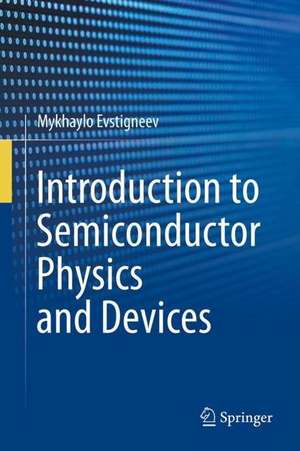Introduction to Semiconductor Physics and Devices
Autor Mykhaylo Evstigneeven Limba Engleză Hardback – 30 sep 2022
| Toate formatele și edițiile | Preț | Express |
|---|---|---|
| Paperback (1) | 390.63 lei 6-8 săpt. | |
| Springer International Publishing – 2 oct 2023 | 390.63 lei 6-8 săpt. | |
| Hardback (1) | 361.88 lei 3-5 săpt. | +33.93 lei 4-10 zile |
| Springer International Publishing – 30 sep 2022 | 361.88 lei 3-5 săpt. | +33.93 lei 4-10 zile |
Preț: 361.88 lei
Nou
Puncte Express: 543
Preț estimativ în valută:
69.25€ • 72.48$ • 57.63£
69.25€ • 72.48$ • 57.63£
Carte disponibilă
Livrare economică 10-24 martie
Livrare express 21-27 februarie pentru 43.92 lei
Preluare comenzi: 021 569.72.76
Specificații
ISBN-13: 9783031084577
ISBN-10: 3031084578
Pagini: 323
Ilustrații: XIV, 323 p. 93 illus.
Dimensiuni: 155 x 235 x 27 mm
Greutate: 0.65 kg
Ediția:1st ed. 2022
Editura: Springer International Publishing
Colecția Springer
Locul publicării:Cham, Switzerland
ISBN-10: 3031084578
Pagini: 323
Ilustrații: XIV, 323 p. 93 illus.
Dimensiuni: 155 x 235 x 27 mm
Greutate: 0.65 kg
Ediția:1st ed. 2022
Editura: Springer International Publishing
Colecția Springer
Locul publicării:Cham, Switzerland
Cuprins
Chapter 1. Principles of Quantum Mechanics.- Chapter 2. Crystal Structure of Solids.- Chapter 3. Equilibrium Statistical Mechanics.- Chapter 4. Band Theory of Solids.- Chapter 5. Semiconductors in Equilibrium.- Chapter 6. Carrier concentration and electric potential.- Chapter 7. Generation-Recombination Processes.- Chapter 8. Carrier Transport.- Chapter 9. Metal-Semiconductor Contact.- Chapter 10. Metal-Oxide-Semiconductor Field Effect Transistor (MOSFET).- Chapter 11. PN Junction Diode.- Chapter 12. Optoelectronic Devices.
Notă biografică
The author initially studied at the Faculty of Radio-Physics, Electronics and Computer Systems of the National Taras Shevchenko University of Kyiv, Ukraine, and then at the Department of Physics and Astronomy, York University, Canada. He obtained his PhD in Physics at York University in 2002, after which he did postdoctoral research at Bielefeld University, Germany. He currently holds a position as an Associate Professor in the Department of Physics and Physical Oceanography at the Memorial University of Newfoundland, Canada. He has published papers in non-equilibrium statistical physics, stochastic processes, surface science, biophysics, and semiconductor physics.
Textul de pe ultima copertă
This classroom-tested textbook provides a self-contained one-semester course in semiconductor physics and devices that is ideal preparation for students to enter burgeoning quantum industries. Unlike other textbooks on semiconductor device physics, it provides a brief but comprehensive introduction to quantum physics and statistical physics, with derivations and explanations of the key facts that are suitable for second-year undergraduates, rather than simply postulating the main results. The book is structured into three parts, each of which can be covered in around ten lectures. The first part covers fundamental background material such as quantum and statistical physics, and elements of crystallography and band theory of solids. Since this provides a vital foundation for the rest of the text, concepts are explained and derived in more detail than in comparable texts. For example, the concepts of measurement and collapse of the wave function, which are typically omitted, are presented in this text in language accessible to second-year students. The second part covers semiconductors in and out of equilibrium, and gives details which are not commonly presented, such as a derivation of the density of states using dimensional analysis, and calculation of the concentration of ionized impurities from the grand canonical distribution. Special attention is paid to the solution of Poisson’s equation, a topic that is feared by many undergraduates but is brought back down to earth by techniques and analogies from first-year physics. Finally, in the third part, the material in parts 2 and 3 is applied to describe simple semiconductor devices, including the MOSFET, the Schottky and PN-junction diodes, and optoelectronic devices. With a wide range of exercises, this textbook is readily adoptable for an undergraduate course on semiconductor physics devices, and with its emphasis on consolidating and applying knowledge of fundamental physics, it will leave students in engineering and the physical sciences well prepared for a future where quantum industries proliferate.
Caracteristici
Covers quantum and statistical physics in more depth than other semiconductor device physics textbooks Suitable for a self-contained one-semester course, with original exercises to hone students’ understanding Demystifies topics that often create pitfalls for students by using techniques and analogies from first-year physics
